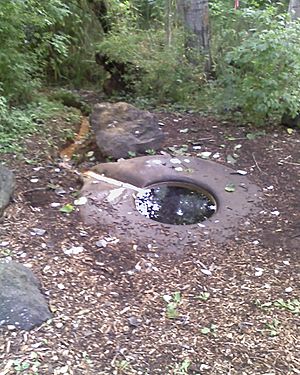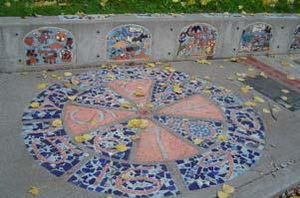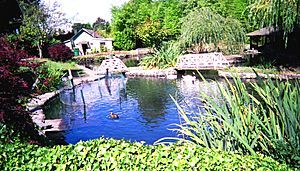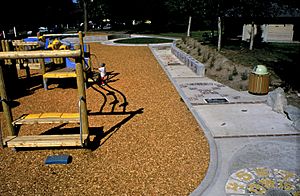Licton Springs, Seattle facts for kids
Quick facts for kids
Licton Springs, Seattle
|
|
|---|---|
|
Seattle Neighborhood
|
|
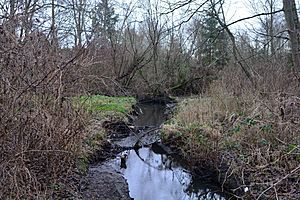
Licton Springs Park
|
|
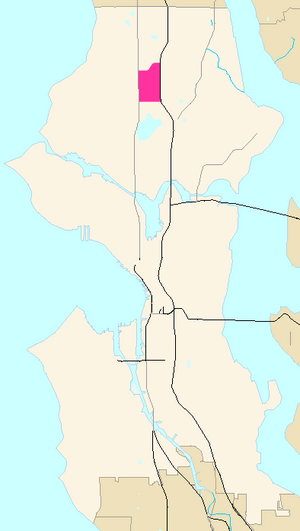
Licton Springs Highlighted in Pink
|
|
| Country | United States |
| State | Washington |
| County | King |
| City | Seattle |
| Time zone | UTC−8 (PST) |
| • Summer (DST) | UTC−7 (PDT) |
| Zip Code |
98103
|
| Area Code | 206 |
Licton Springs is a cool neighborhood in North Seattle. It's also called North College Park. This area is surrounded by major roads. To the east, you'll find Interstate 5. To the west is Aurora Avenue N (SR 99). The neighborhood is bordered by N 85th Street to the south and N Northgate Way to the north.
Contents
What is Licton Springs?
Licton Springs is a neighborhood named after a special natural spring. This spring is located at the north end of Licton Springs Park. The name Licton comes from the Lushootseed language. It means "reddish mud," which describes the color of the spring's mud.
Native American History
Long ago, Native American tribes like the Dkhw’Duw’Absh and Xacuabš used these springs. They considered the area a spiritual health spa. This was happening about 8,000 years ago, after the last Ice Age. Today, these tribes are known as the Duwamish tribe.
In 2019, the spring and its park became a city landmark. This was the first Native cultural site in Seattle to get this special recognition.
How the Area Developed
Around 1870, an early Seattle settler named David Denny built a summer cabin near the springs. The natural spring used to feed Green Lake. However, it was later covered and drained into the sewer system. This happened because of pollution from homes built nearby.
The Park Today
Even though the original plan for a large park by the Olmsted Brothers never happened, there is a park today. You can find the spring in this park. In the mid-1960s, people started working to restore the area. They created a small pond and planted native plants. The park now has a natural wetland area and other fun features.
The Native American presence is still strong here. The Indian Heritage School at Wilson-Pacific is in the neighborhood. This school often hosts Pow Wows, which are traditional Native American gatherings. You can also see amazing wall murals by artist Andrew Morrison there.
Transportation and Farms
In 1906, the Everett and Interurban Railway Company built a trolley line through the neighborhood. These trolleys became a big part of daily life. They helped new neighborhoods like Licton Springs grow around the trolley stops.
The main road, Aurora Avenue N, was paved in the 1910s and 1920s. In the early days, this road had "tourist camps" for people traveling by car. These later became the motels we know today.
The Pilling family had a dairy farm here from 1909 to 1933. Today, this area is Pilling's Pond, a great place to see waterfowl and other birds. There were also Japanese-American farms and greenhouses. Sadly, these families were forced to leave during the Internment of Japanese Americans from 1942 to 1945.
North College Park and Nature
Seattle officially took over most of North Seattle in 1954. The North College Park area became more defined when North Seattle College was built in 1970.
Licton Springs and the Sunny Walter–Pillings Pond are part of a natural water system called the Densmore Drainage Basin. The springs near the North Police Precinct and North Seattle College are the start of a stream called Thornton Creek. This stream flows under Interstate 5 and through the area near Northgate Mall.
People in the neighborhood and at North Seattle Community College are working to restore the natural habitats. The college grounds have a special native habitat. It's like a restored version of the natural area that was once a bog where Native Americans harvested cranberries.
Images for kids
 | Stephanie Wilson |
 | Charles Bolden |
 | Ronald McNair |
 | Frederick D. Gregory |


